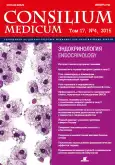Iodine deficiency: current status
- Authors: Platonova N.M1, Troshina E.A1
-
Affiliations:
- Endocrinology research center of the Ministry of Health of the Russian Federation
- Issue: Vol 17, No 4 (2015)
- Pages: 44-50
- Section: Articles
- URL: https://journal-vniispk.ru/2075-1753/article/view/94275
- ID: 94275
Cite item
Abstract
Full Text
##article.viewOnOriginalSite##About the authors
N. M Platonova
Endocrinology research center of the Ministry of Health of the Russian Federation
Email: doc-platonova@inbox.ru
д-р мед. наук, гл. науч. сотр. отд-ния терапии с группой патологии метаболизма и ожирения ФГБУ ЭНЦ 117036, Russian Federation, Moscow, ul. Dmitria Ul'ianova, d. 11
E. A Troshina
Endocrinology research center of the Ministry of Health of the Russian Federationд-р мед. наук, проф., зав. отд-нием терапии с группой патологии метаболизма и ожирения ФГБУ ЭНЦ 117036, Russian Federation, Moscow, ul. Dmitria Ul'ianova, d. 11
References
- WHO, UNICEF, ICCIDD. Assessment of iodine deficiency disorders and monitoring their elimination. Geneva: WHO, WHO/Euro/NUT, 2001; p. 1-230.
- WHO, UNICEF, ICCIDD. Assessment of iodine deficiency disorders and monitoring their elimination. 3rd ed. Geneva: WHO, 2007; p. 10-2.
- Hetzel B.S. Iodine deficiency disorders (IDD) and their eradication. Lancet 1983; 2: 1126-9.
- Zimmermann M.B, Jooste P.L, Pandav C.S. Iodine deficiency disorders. Lancet 2008; 372: 1251-62.
- Chan S et al. Thyroid hormones and central nervous system development. J Endocrinol 2000; 165: 1-8.
- The spectrum of thyroid disorders in an iodinedeficient community: the Pescopagano survey. J Clin Endocrinol Metab 1999; 84: 561-6.
- Hetzel B.S, Pandav C.S. S.O.S. for a billion. The conquest of Iodine Deficiency Disorders. 2nd Ed. Dehli: Oxford University press publ 1996; p. 46-7.
- Zimmermann M.B, Jooste P.L, Pandav C.S. Iodine deficiency disorders. Lancet 2008; 372: 1251-62.
- De Benoist B, Mc Lean E, Andersson M, Rogers L. Iodine deficiency in 2007: global progress since 2003. Food Nutr Bull 2008; 29: 195-202.
- Дедов И.И., Герасимов Г.А., Свириденко Н.Ю. Йододефицитные заболевания в Российской Федерации (эпидемиология, диагностика. профилактика). Методическое пособие. М.,1999; 3-15.
- WHO Secretariat, Anderson M, De Benoist B et al. Prevention and control of iodine deficiency in pregnant and lactating women and in children less than 2-years - old; conclusions and recommendations of the Technical Consultation. Public Health Nutr 2007; 10: 1606-11.
- Zimmermann M.B. Iodine deficiency and excess in children: worldwide status in 2013. Endocr Pract 2013; 19 (5): 839-46.
- Pearce E.N, Andersson M, Zimmermann M.B. Global iodine nutrition: Where do we stand in 2013? Thyroid 2013; 23 (5): 523-8. doi: 10.1089/thy.2013.0128. Epub 2013 Apr 18.
- Kusic Z et al. History of endemic goiter in Croatia: from severe iodine deficiency to iodine sufficiency. Coll Antropol 2005; 29: 9-16.
- Lind R, Kumnig G, Heinsch M et al. Iodine supplementation in Austria: methods and results. Thyroid 2002; 12: 903-7.
- Gärtner R. Is iodine deficiency still relevant? MMW Fortschr Med 2007; 22; 149 (8): 29-32.
- Baczyk M, Rucha a M, Pisarek M et al. Iodine prophylaxis in children population on the Wielkopolska Region area from year 1992 to 2005. Endokrynol Pol 2006; 57 (2): 110-5.
- Zimmermann M.B, Andersson M, Update on iodine status worldwide. Curr Opin Endocrinol Diabetes Obes 2012; 19: 392-7.
- Трошина Е.А., Платонова Н.М., Абдулхабирова Ф.М., Герасимов Г.А. Йододефицитные заболевания в Российской Федерации: время принятия решений. Под ред. Дедова И.И., Мельниченко Г.А. М., 2012.
- Платонова Н.М. Йододефицитные заболевания: профилактика, диагностика, лечние, мониторинг: Aвтореф. дис. … д - ра мед. наук. М., 2010.
- Azizi F, Kalani H, Kimiagar M et al. Physical, neuromotor and intellectual impairment in non_cretinous schoolchildren with iodine deficiency. Int J Vitam Nutr Res 1995; 65: 199-205.
- Boyages S.C, Collins J.K, Maberly G.F et al. Iodine deficiency impairs intellectual and neuromotor development in apparentlynormal persons. A study of rural inhabitants of north central China. Med J 1989; 150: 676-2.
- Choudhury N, Gorman K.S. Subclinical prenatal iodine deficiency negatively affects infant development in Northern China. J Nutr 2003; 133: 3162-5.
- Fenzi G.F, Giusti L.F, Aghini Lombardi F et al. Neuropsychological assessment in schoolchildren from an area of moderate iodine defiiency. J Endocrinol Invest 1990; 13: 427-31.
- Gao T.S, Teng W.P, Shan Z.Y et al. Effect of different iodine intake on schoolchildren’s thyroid diseases and intelligence in rural areas. Chin Med J (Engl) 2004; 117: 1518-22.
- Huda S.N, Grantham Mc Gregor S.M, Rahman K.M, Tomkins A. Biochemical hypothyroidism secondary to iodine deficiency is associated with poor school achievement and cognition in Bangladeshi children. J Nutr 1999; 129: 980-97.
- Bougma K, Aboud F.E, Harding K.B, Marquis G.S. Iodine and mental development of children 5 years old and under: a systematic review and meta analysis. Nutrients 2013; 5 (4): 1384-416.
- Bleichrodt N, Born M.P. A metaanalysis of research on iodine and its relationship to cognitive development. In: Stanbury F.A, editor. The damaged brain of iodine deficiency cognitive, behavioral, neuromotor, educative aspects. New York [etc.]: Cognizant Communication Corporation; 1994; p. VII, 335 S.
- Трошина Е.А., Соловьева С.И., Платонова Н.М. и др. Интеллектуальное развитие школьников с диффузным клиническим эутиреоидным зобом в регионах с различным йодным обеспечением. Педиатрическая фармакология. 2009; 6 (2): 43-8.
- Щеплягина Л.А. Препараты йода в укреплении здоровья детей. Consilium Medicum. Педиатрия. (Прил.). 2010; 12 (1): 12-16.
- Taylor P.N, Okosieme O.E, Dayan C.M, Lazarus J.H. Impact of iodine supplementation in mild to moderate iodine deficiency: Systematic review and metaanalysis. Eur J Endocrinol 2013. 170 (1): 1-15.
- Anderson M, Benoist B, Delange F, Zupan J. Orevention and control of iodine deficiency in pregnant and lactating women and in children less that 2-years - old: conclusion and recommendations of the Technical Consultations. Public Health nutrition 2007; 10 (12A): 1606-11.
- On WHO Guidelines «Fortification of food - grade salt with iodine for the prevention and control of iodine deficiency disorders, Geneva: WHO 2014: 1-45.
Supplementary files






